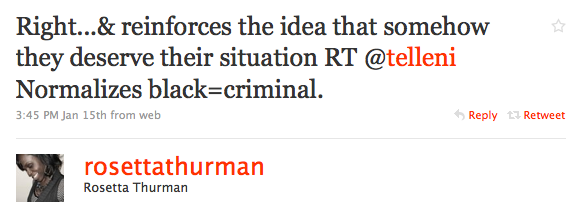This post is part of the Nonprofit Millennial Bloggers Alliance‘s response to the situation in Haiti. We encourage other Millennials to get informed and get involved.
It happened after Hurricane Katrina, too. No obvious Canadian example is coming to mind, but I’m sure one (or many) exists.
I’m speaking of the racialized language that media and public commentary use to describe the actions of black people in the midst of a devastating catastrophe.
Take the verb “loot”. Media are using it to describe what is happening as Haitians access food, water, and other materials necessary for survival.
Some recent examples from my local paper:
- Haiti police open fire on looters, killing one, as tensions mount (Vancouver Sun)
- Bodies pile up, fears of riots loom in Haiti (Vancouver Sun)
The Merriam-Webster Online Dictionary defines looting as:
1 a : to plunder or sack in war b : to rob especially on a large scale and usually by violence or corruption
2 : to seize and carry away by force especially in war
Firstly, this isn’t war. Inciting language relating situations to war is a strategy used to increase approval of war-like tactics, often by governments – “war on drugs” and “war on terror” are two recent examples. I personally don’t want to see war-like tactics used on a devastated country without the infrastructure to defend itself.
Secondly, survival isn’t criminal. I hope that you and I would share an instinct to protect our own lives and those of people close to us by accessing basic supplies needed for life. I don’t know exactly what’s happening on the ground in Haiti. I’m really grateful I don’t have to experience and I hope I never do. But I’d be pretty pissed if anyone described my survival instinct criminal.
Some related headlines that criminalize the situation in Haiti:
- Security fears mount in lawless post-earthquake Haiti (Washington Post)
- Looting raises tension in Haiti (Globe and Mail)
- “As fear and frustration spread across Haiti’s shattered capital, The Star is witness to a scene of lawless horror.” (Mob justice in Haiti, Toronto Star)
Post-Katrina behaviour was similarly criminalized. Sarah Kauffman notes that “for the first days after the hurricane, news outlets focused on what we now know to be greatly exaggerated individual acts of crime and violence (Dwyer and Drew, 2005).” In addition to magnifying the actions of a few, language used was blatantly race-based. The loot vs. find photo controversy demonstrated that black and white people exhibiting the exact same behaviour were reported on differently by the media.
Fellow Nonprofit Millennial Bloggers Alliance member Rosetta Thurman shared some discussion about this on Friday…

So, what do we do about it?
My small part was a workshop on interpersonal communication I facilitated on Friday to a group of youth volunteers from a local hospital, many of whom intend to enter the health field as doctors, etc. I facilitate a similar one in my work at SFU (developed by the lovely Wendy Norman) as part of a Passport to Leadership series of workshop.
While the workshop starts off fairly predictably (e.g. importance of listening) I soon veer into the intersection of power and words. How language and word choice can further marginalize people who face barriers. How intent doesn’t matter when perception of word choice is harmful. We did an exercise where I gave them fairly controversial statements and asked them what assumptions were made by the speaker, how power was embedded in the words, who benefits if people agree with the statement, and if a positive intention might exist behind the statement.
These youth are going to be on the front lines, dealing with a diverse public coming to them in vulnerable situations. Interpersonal communication isn’t just about being nice and listening closely. It’s about checking your language and critically examining that of others.
Like the media currently isn’t as it criminalizes black people.
Other Haiti-relevant posts by the Nonprofit Millennial Bloggers Alliance:
- Longterm Help for Haiti (Social Citizen)
- One-off or a way of life? (Nonprofit Periscope)
- Lessons from Haiti: Mobile Giving in 2010 (Know Your Own Bone)
